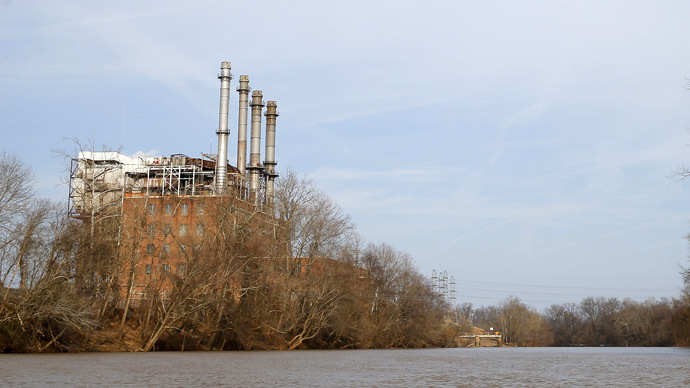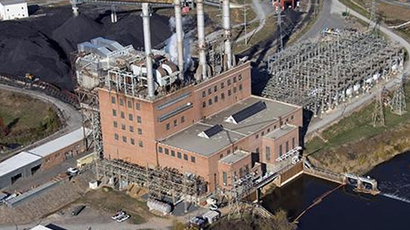Duke Energy CEO: Customers will foot bill to clean up toxic coal lagoons

Duke Energy faces a $1 billion price tag to clean its coal ash waste pits in North Carolina after the company leaked around 35 million gallons of toxic coal slurry into the Dan River last month. Who will pay the bill? Customers, says Duke's CEO.
Duke, the largest supplier of electricity in the United States, was ordered by a judge late last week to address groundwater contamination at its 33 coal ash storage lagoons at 14 sites across North Carolina. The decision came about one month after as much as 35 million gallons of coal ash and arsenic-contaminated water spilled into the Dan River due to a ruptured pipe at a Duke Energy power plant in Eden, North Carolina.
Based on a similar effort in South Carolina - in which Santee Cooper utility needed $250 million to clear 11 million tons of ash – Duke’s expenses to empty its ash sites could hit $1 billion, according to the state Utilities Commission. Duke has around 106 million total tons of coal ash waste in the state, 84 million of which were dumped into simple ponds, likely resulting in ground contamination.
Duke Energy CEO Lynn Good said the company will carry costs for cleaning the Dan River, around 70 miles of which is now caked with toxic coal waste. But as for the cleaning of the remaining sites, Good says it’s part of normal consumer costs.
“Because that ash was created over decades for the generation of electricity, we do believe that ash-pond disposal costs are ultimately part of our cost structure,” Good told the Charlotte Observer on Friday. “But the determination of payment will be up to the North Carolina Utilities Commission and how they handle that, so I think that’s something that will unfold over time.”
The state Utilities Commission will have final say on whether Duke’s 3.2 million customers will foot the bill. To meet a $1 billion effort, a household may have to pay between 50 cents and 75 cents a month for the next 10 to 15 years, the Commission official told the Raleigh News & Observer.
Critics have long said the waste ponds needed to be addressed.
“Duke has profited from doing the cheapest thing for decades, and it’s now time for them to pay the bill,” D.J. Gerken, a lawyer for the Southern Environmental Law Center, told the News & Observer.
A state judge ruled in favor of the Southern Environmental Law Center last week, demanding Duke clear the storage ponds. Three prior lawsuits challenging Duke's lagoons were all blocked by state regulators at the North Carolina Department of Environment and Natural Resources.
Coal ash is waste left after burning coal that contains arsenic, mercury, lead, and over a dozen other heavy metals, many of which are toxic.
Following last month’s discovery of pipe leak into the Dan River, regulators found two more storm drains nearby bleeding waste without permits. One is still leaking into the river while the other is not leaking enough arsenic to be considered a problem by state water quality standards, WRAL reported.
Duke spokesman Thomas Williams told Newsweek on Monday that the two other storm drains are “in the permitting process,” but said he would not get “into specific pipe leaks.”
The state environmental department has been subpoenaed by federal prosecutors as part of the criminal investigation following the major leak. The department conducted an audit of Duke permits after the spill, issuing violation citations for five power plants that Duke had “neither applied for or obtained stormwater permits,” according to a press release.
North Carolina Governor Pat McCrory is also taking heat for the spill – not only because of accusations of a lax regulatory structure that has allowed Duke to unsafely store the ash, but also because he worked at Duke for 28 years. He said Monday that “all forms of energy have a downside,” though he stressed that Duke did not take proper care before the spill.
“What’s discouraging about this Dan River situation, and several others that are coming up now, is the responsibility wasn’t taken care of somewhere within that organization,” he said, according to the News & Observer. “Someone in that massive organization, which I used to work for, just assumed that it was OK. You can make assumptions on anything.”














